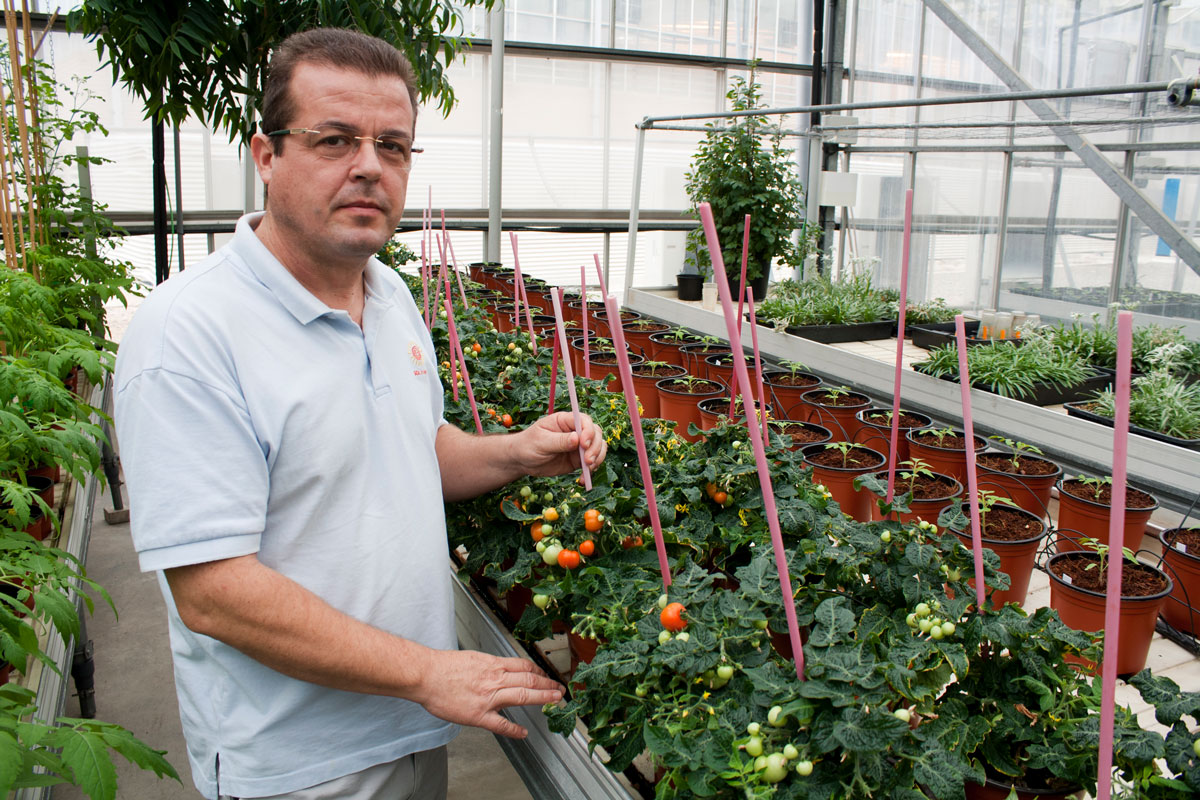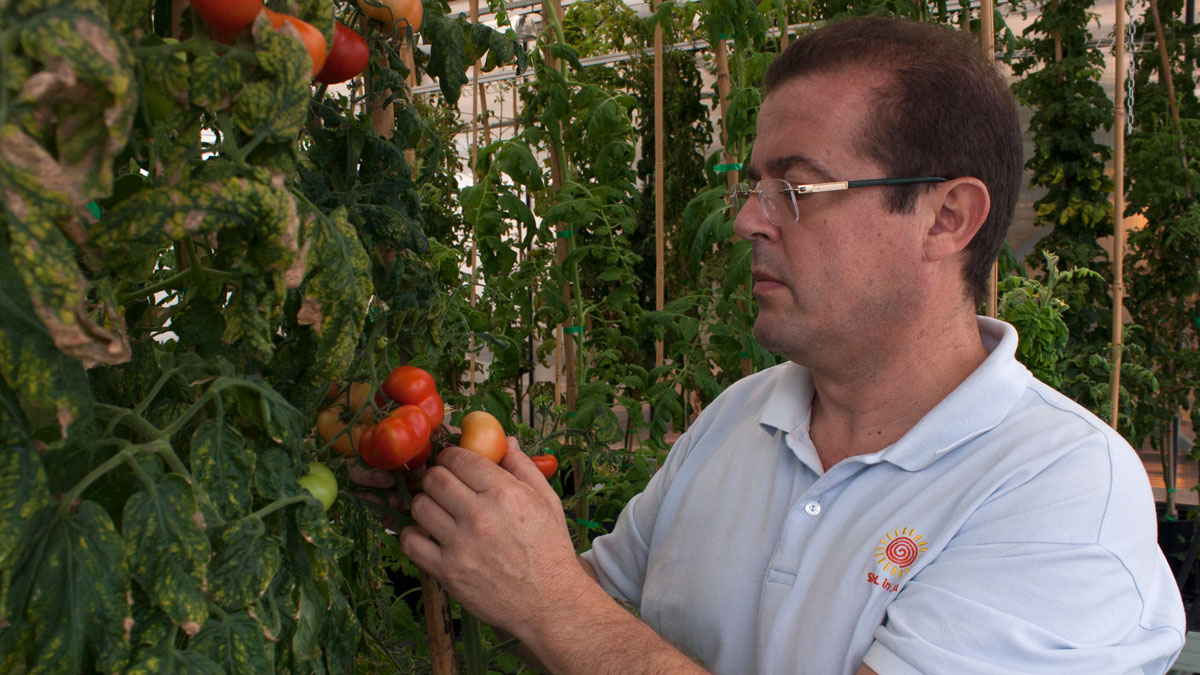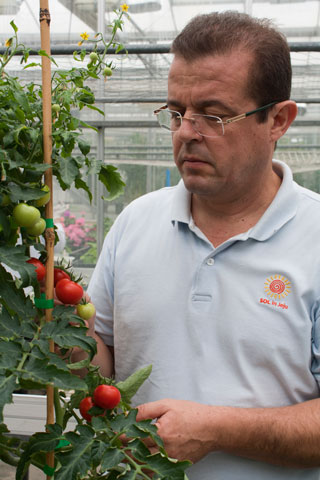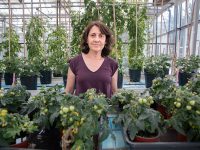Interview with Antonio Granell
«Using knowledge to develop something is better than leaving it to fate»
Researcher at the Institute for Plant Molecular and Cell Biology Eduardo Primo Yúfera

In the last months, the generalist press has reported the results of the research conducted by Antonio Granell several times, specially with regards to a better understanding of the tomato genome. The researcher and his team of the Institute for Plant Molecular and Cell Biology Eduardo Primo Yúfera, a joint centre of the Polytechnic University of Valencia and the CSIC (the Spanish National Research Council), have worked in coordination with more than 300 scientists from other countries in the sequencing of chromosome 9 of this essential fruit in our diet. Besides, thanks to his work, we can now know why the tomatoes from the supermarket are so flavour-lacking: the inactivity of the GLK2 gene.
You have compared the tomato genome with an unexplored map. Where are we at the moment?
At a very early point. Of the more than 30,000 genes that have been predicted to exist, we know very little about a few hundreds. The knowledge we have is very limited compared to the complexity of the genome. However, the tomato is a model system of fleshy fruit and, as such, it has been studied quite a lot. That is, the knowledge we have of the development of fruits in the case of the tomato is greater than the knowledge we could have of any other fruit.
«Seed companies have focused on equipping the varieties they sell to producers with genes for resistance against the diseases that have appeared. As a result, some of the quality characters of the fruit have been lost»
Why are we interested in having a better knowledge of this genetic map?
The tomato is easily genetically transformable. Which is to say, its transformation can be used as a system to find out a gene’s function. You modify the expression of this gene and you can know the consequence it has on the phenotype. The knowledge of the sequenced tomato genome we have now provides us with detailed information of the highest resolution. Not only is the tomato genome sequenced, but it is very well sequenced and very well connected, and that is important. It is often said that a genome is sequenced, but that we do not have the assembled puzzle yet, although there are pieces that are unlinked from each other. In the case of the tomato, a great effort was made to make it a model genome not only for the tomato and its commercial or wild varieties, but for other Solanaceae with an important presence in crops, such as eggplants, peppers, tobacco, petunias, and, although it is a little distantly related, even coffee.
We buy pretty but tasteless tomatoes in supermarkets. What explanation does such an absurd phenomenon have?
The eyes give more weight to appearance than to content. However, as a friend of mine says, the first time you buy with you eyes and the second, for the taste. Unless you are simply dragged by the society we live in, by the pace of life, and you buy what is available. The first thing the industry that produces the tomato varieties cares about is that the plants give fruit. And one of the main obstacles for a plant to give fruit is for it to contract a disease. Thus, the seed companies have focused on equipping the varieties they sell to producers with genes for resistance against the diseases that have appeared. As a result, some of the quality characters of the fruit have been lost. The seed companies turn the plant into a sort of factory; it has to always produce the same number of kilograms on a constant basis. The external appearance of the fruit has been given priority, as has the fact that it must arrive in good conditions after the transportation process. That is why the tomato varieties with a harder fruit that can endure these conditions have been selected. There are a number of genes that affect the ripening so that the fruits do not arrive to the table too ripe or even deformed. These genes can also affect flavour. The modern way of life makes it more difficult to consume quality tomatoes because we usually buy the, in large stores; these tomatoes were harvested a week before, they have been stored and transported.
«The quality of the tomato is very complex. Genetically speaking, it is very difficult to maintain quality when its characteristics depend essentially on three things: sugars, organic acids and scents»
Where can we buy tomatoes that taste like tomatoes?
The general recommendation is to always buy local. That means that is has to be a seasonal tomato that has been cultivated in your own area. They can be found in greengrocer’s that deal with small producers. We are used to having tomatoes all year round, because there are varieties that can be cultivated in a greenhouse under certain conditions, but these tomatoes are sold in large stores that have taken the appearance improvements and left quality aside. On the other hand, the quality of the tomato is very complex. Genetically speaking, it is very difficult to maintain quality when its characteristics depend essentially on three things: sugars, organic acids and scents. Making a simultaneous improvement of a combination of these compounds in a way that pleases people is very difficult and requires a knowledge that we did not have until now, as well as great time and personal investment.
Besides affecting the flavour, what other characteristics can the absence of the protein codified by the GLK2 gene alter?
A lot of producers do not like their fruits to have green fibres. Normally, the GLK2 gene is a factor of transcription that causes the development in the fruit of more active chloroplasts. Chloroplasts are the machinery of the cell that synthetises sugars. It is what catches sunlight and makes it possible for the plant cells to produce sugars, among other things. It seems that the reason why plants that produce fruits which were not so photosynthetically active were selected in a certain moment is that in some greenhouse conditions, the fruit having an excess of chloroplasts can cause a series of undesired effects: it is likely because of the photo-oxidation, in conditions where there is an excess of light, that alterations in the ripening are produced and the part of the fibres do not ripen adequately. It can also cause cracks in the skin of the radial zone. That is not aesthetically pleasing. This is found a lot in Valencian tomatoes and other types of tomatoes because they have the wild GLK2 type, which produces a lot of chloroplasts but is not liked by commerce in general.

© Ismael Marco
To what degree could the discoveries you have made help produce better tomatoes?
In the specific case of the GLK2 gene, we know that if we search for more active variations of this gene, in normal greenhouse conditions, the fruits have more sugars and flavour. Usually, a fruit accumulates sugars, which are transported from the leaves. What our article states1, and had been a controversial topic before, is that the fruit also contributes by making photosynthates that end up improving its quality. We now have a clear objective: to improve the fruit’s photosynthesis to increase its quality. The fruit’s photosynthesis not only allows it to have more sugars, the chloroplast is the place where other compounds that also contribute to flavour appear.
In your opinion, would the food industry, which works with huge figures and normally prioritises quantity to quality, accept changes in the production model?
If consumers demand a specific product, which is compatible with the interests of the large stores, it is logical for them to have to satisfy their customers. We must establish mechanisms through which the consumer can communicate to the large stores that he does not want to buy a tasteless product, as attractive and cheap as it may be. Habits change when people demand what they want.
«Getting varieties that satisfy the consumer or the producer or any member of the chain is now easier than ever thanks to the biotechnological techniques»
The results of your research have been used as arguments against the use of genetically modified products. What do you think of this?
It has no grounds. All commercial tomatoes are obtained through methods of improvement, crossings and selections. In some cases, we are using improvements assisted by markers, in which we use certain techniques that do not involve genetically modified plants, we simply guide the selection towards some crossings that favour the progress of the character we want in a variety. In any case, genetically modified products have anything to do with the lack of quality. What is more, I think certain genetically modified varieties from many laboratories around the world can produce tomatoes of better quality and that this is the way you earn prestige in the consumer’s world. What consumers want to see is a personal benefit. If you see that a particular tomato is better, you should not worry about how it has been produced, as long as you trust the laboratories of quality control of the public institutions, who have already ensured that the mechanism through which this tomato has been obtained is healthy and will not affect you. Once a series of protocols to ensure there is no risk have been established, genetic modifications are just another way to obtain a product that people like and is beneficial.

© Ismael Marco
In the eternal debate between ecologists and scientists about transgenic products, what is your position?
The position of anyone who knows what is being done with the highest exactitude. Knowledge is never bad. Getting varieties that satisfy the consumer or the producer or any member of the chain is now easier than ever thanks to the biotechnological techniques and, moreover, we have a better understanding of the result. Nature is the source of the most appetising things and the worst poisons there are. There are toxins that are natural and toxins that are synthetised in a laboratory. Using knowledge to develop something is always better than leaving it to fate.
Nonetheless, the public opinion has a very negative conception of genetically modified organisms…
That happens because some people create social alarm and we are very easy to manipulate for specific interests. An advanced society has to trust but at the same time keep an eye open to supervise. I think we must always keep an open mind, have control mechanisms so that nothing can harm anyone and trust that the scientific advances have to improve people’s quality of life. We cannot demonise a technology that allows us to save a lot of lives when it is used to develop certain pharmaceutical products and reject its application to food. It is the product that has to be evaluated, regardless of the technology. There should not be any taboo techniques.
What do you think of ecological farming, which does not use chemical products?
It is a good option. People have to decide what they want to buy. Normally, the disadvantage is that you have to pay a higher price. The worst enemies of the farmer are diseases. Ecological farming needs to handle cultivation very well, and not everyone knows how to do that. That means that a producer who does not know how to do things well in ecological farming usually gets a very low productivity. Furthermore, the material many of these ecological greengrocers’ normally sell lasts very little time and is not treated with fungicides. That is very good if your pace of life allows you to go every day to the greengrocer’s to get a tomato, which has not yet been attacked by a fungus, and you eat it that night. Many of these varieties have no resistance to diseases. They are old varieties and the improvement industries have not worked on them. They are much more susceptible to attacks of fungi and other diseases. We can hardly feed everyone by cultivating products in the traditional way, with varieties that have no resistance. Which is to say, we have to make use of the knowledge we have and develop plants that are capable of better enduring the continuous attack of new diseases and that can produce to feed. We are a lot of people in this world. The ecologists could hardly feed so many people.
1. Granell is the co-author of an article published in Science, where he explains his discoveries about the tomato genome related to flavour: Powell, A. L. T. et al., (2012). «Uniform ripening encodes a Golden 2-like transcription factor regulating tomato fruit chloroplast development». Science, 6089 (336): 1711-1715. (Go back)





